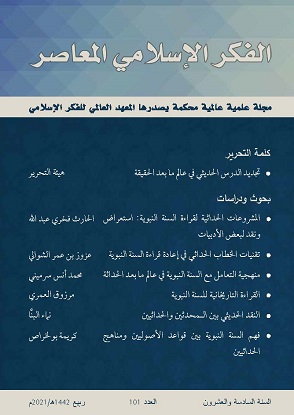Abstract
This study concerns the context of research pertaining to the methodology of approaching the Sunnah of the Prophet vis a vis the dilemma of modernism and postmodernism; a dilemma which has confronted the traditional Islamic system with many issues and questions. The study proposes an analytical model for modernist and traditional perspectives in order to compare them and bring them back to their early origins. This proposal is based on three levels: philosophy and worldview, the methods used in the context of this worldview, and the cognitive tools produced by those approaches. The study then proceeds to examine the possibility of convergence between the traditional and modernist perspectives, rejecting the possibility of convergence in worldview and philosophy, while finding no obstacle to their agreement on the matter of tools. As for the possibility of convergence in methodologies, the study analyzes two modernist approaches, namely the historicist and the hermeneutical, and juxtaposes them with the traditional approaches of which can provide an Islamic foundation for them. The study contends that these two approaches (i.e., historicist and hermeneutical) adhere to the overall [modernist] worldview, meaning that it is incorrect to read the Sunnah through these approaches [i.e., in isolation of an Islamic worldview]. If these two approaches read the Sunnah [through a modernist worldview], then it will have to be on a compromising ground that brings together the [modernist and traditional Islamic worldviews], where the conditions for either of them are not fulfilled. The study then proceeds to further analyze the tools of modernist approaches, doing so through two necessary means. The first is that of a methodological awareness concerned with defining the mechanisms and places for benefiting from these tools. The second having to do with the methodological imbalance in which it is concerned with highlighting the positions and the conditions that make it difficult to invoke them. The study concludes with a survey of applied models of studies in the Sunnah, which can be classified as introducing modernist tools in their approaches; or as being similar in their results to the results produced by the modernist approaches, and giving their opinion on those approaches.





